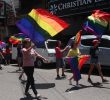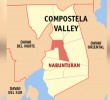The first story of Christmas was the story of Jesus’ parents who arrived at Bethlehem from a long trip and went from house to house to find a bed so that they can sleep from a long trek. They could only find a haystack in a farm for a bed; but it was from such a lowly, humble place that the story of hope, faith and love began.
Two thousand years after, the story of Christmas here in Davao City is that of thousands of Lumad families – Matigsalugs and Manobos – coming down from the hinterlands of Marilog and nearby places to ask kindly charity from city dwellers in the spirit of Christmas.
This Christmas has seen the most number of families around 11,000 of them crammed in public gyms in barangays at night. Children, mothers and fathers flocked together sleeping in *banig* (mats), hammocks or cartoons in the cold of the night.
At daytime, particularly in my subdivision in Matina, at least four to five groups of mothers or children will roam around at day, unmindful of the midday heat to ask around for help. Some would even cajole houses with Christmas songs, mostly sang by the children who probably learned this from public school.
One time, my wife told me she heard one of the carolers sing of a Lumad song translated into Bisaya. I also remember during last year’s Christmas a Lumad family sang this simple song over home-made tambourines with a message asking for help.
“Kay Pasko man karon panahona
dili lang mi maglingaw-lingaw,
gibaktas namo ang kadalanan
aron og mangayo og Pinaskuhan,
kay aron kami tanan malipay,
pauli sa amo makadala og Pinaskuhan.”
(Because Christmas is a time
When we wouldn’t just be enjoying,
We walked through the streets
To ask for Christmas joys,
So that we can all be happy
As we go home with Christmas gifts)
I guess this song captures the culture now of Christmas among the poor. But somehow there is something amiss. After reading Don Pagusara’s column about the Lumads and “Christian” community, what he wrote hit me about how the Lumads have been discriminated and marginalized because of our “popular” and commercialized culture.
It seems disturbing that the first inhabitants of our land are now the marginalized and are asking the settlers or the city government for charity.
It is also strange that the Lumads, with their rich culture of song and dance that we city dwellers imitate during the Kadayawan, are imitating our tongues to sing our Christmas songs.
It is also equally strange that they roam around the city in jeans or branded shirts which happen to come from our relief or charity drives. I could barely see one Lumad roaming the city in their traditional garb.
It seems “popular” culture of the dominant Western-oriented kind has erased the identity of the Lumad. Somehow, it has erased from us the memories of our tongues, our songs, our heroes, the traces of our clothes, our systems and our values.
The Christmas season has made this disparity more apparent, between those who have and the Lumads and the other marginalized sectors who have to beg for the Christmas.
I want to go back to the beginnings of Christmas, as it was a birthing of a new hope of a new generation. Perhaps, again, we should look at Christmas as a beginning of change for our culture.
As my anthropologist friend Myfel Paluga said, we should change the way we look at and celebrate the Lumads. We celebrate not by putting them up as relics or symbols of the past, rather they are living, and living hard to survive. At the same time that the Lumads have come to Davao, a dozen of Lumads representing Mindanao tribes held a “Manilakbayan” (a journey to Manila) to bring government attention of their disappearing land and race brought by mining and plantations’ plunder and violence.
Wherever the Lumads have gone, to the peripheries of the mountains, to the houses of city dwellers, or to the streets leading to Malacañang, they are still looking and reclaiming the land to call home. A land where their tribe can again re-plant, re-grow their food; re-plant their values and culture with schools; re-plant their memories and live on.
Myfel said let this not happen on Christmas or Kadayawan, but let us embrace and retrace the Lumads everyday.
Perhaps that should be the Christmas gift we could give to the Lumads and to ourselves.










